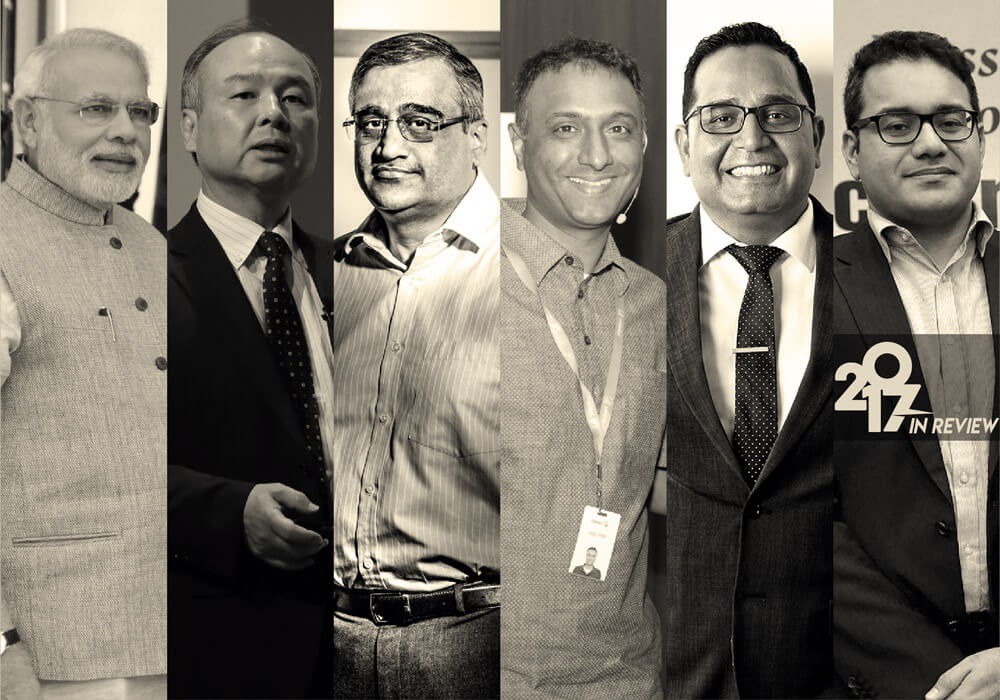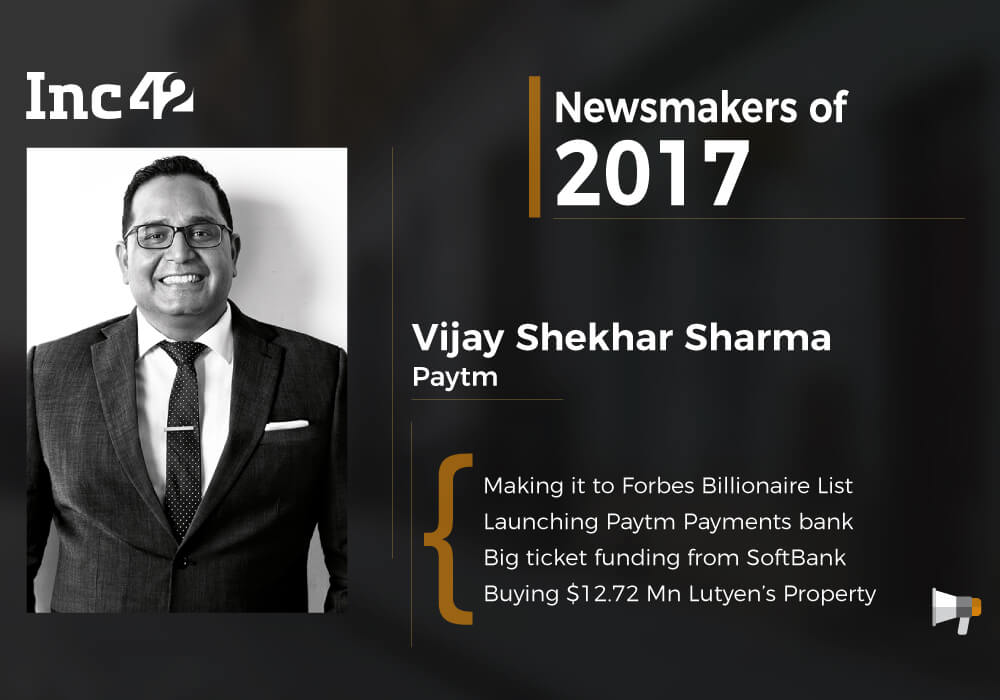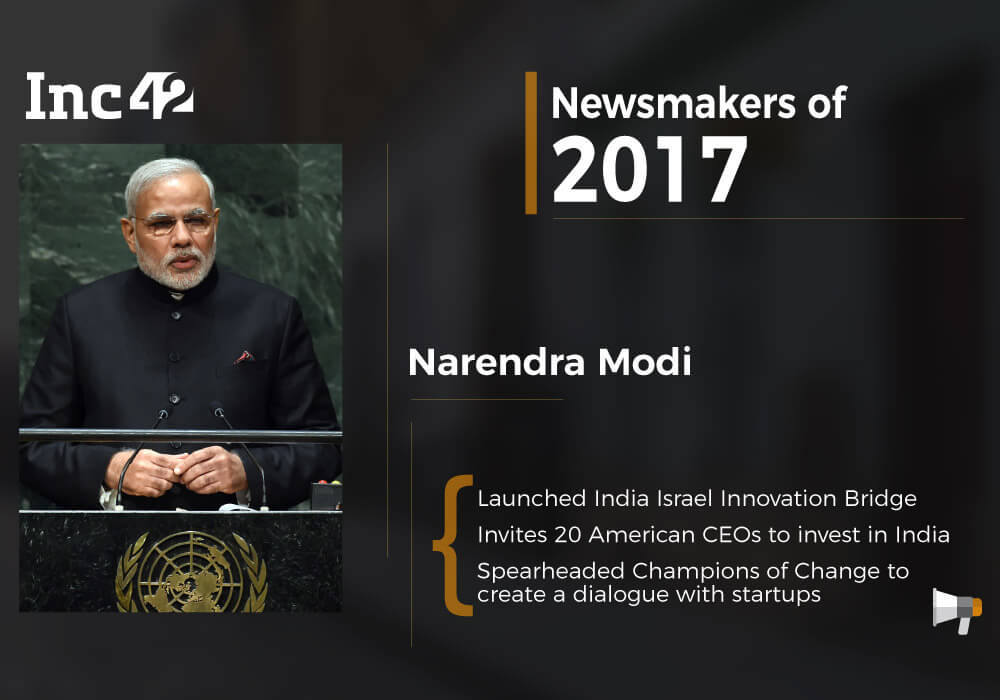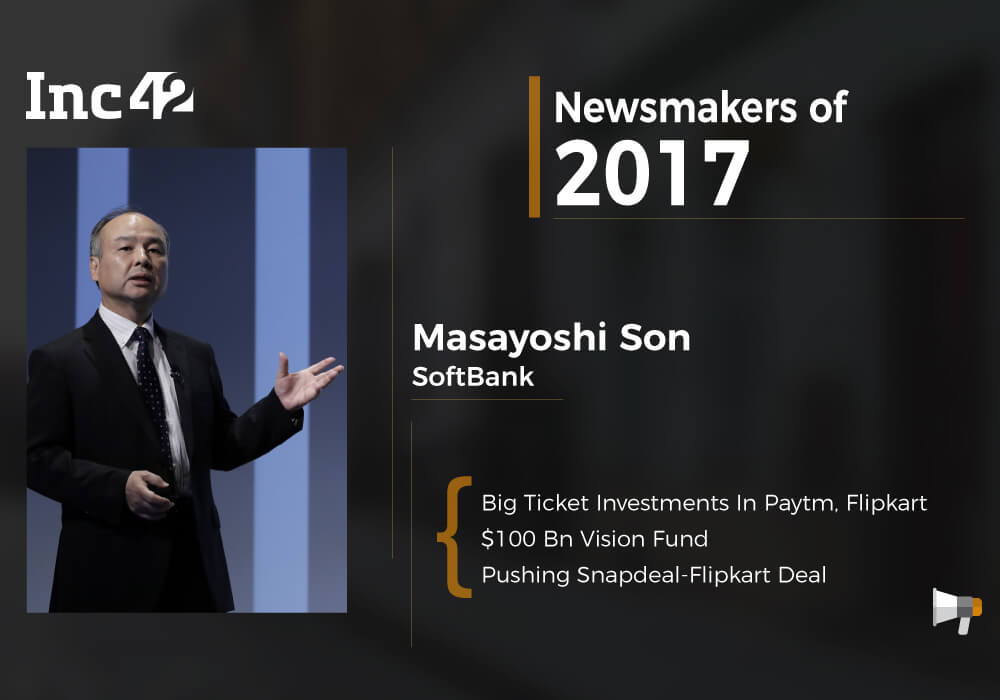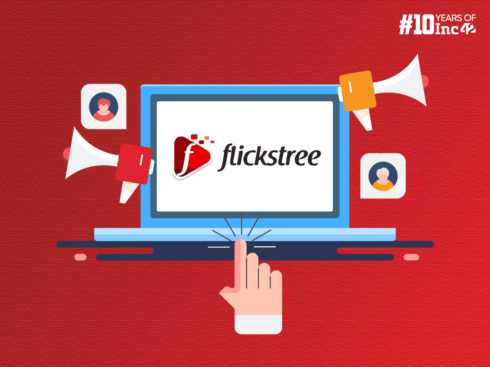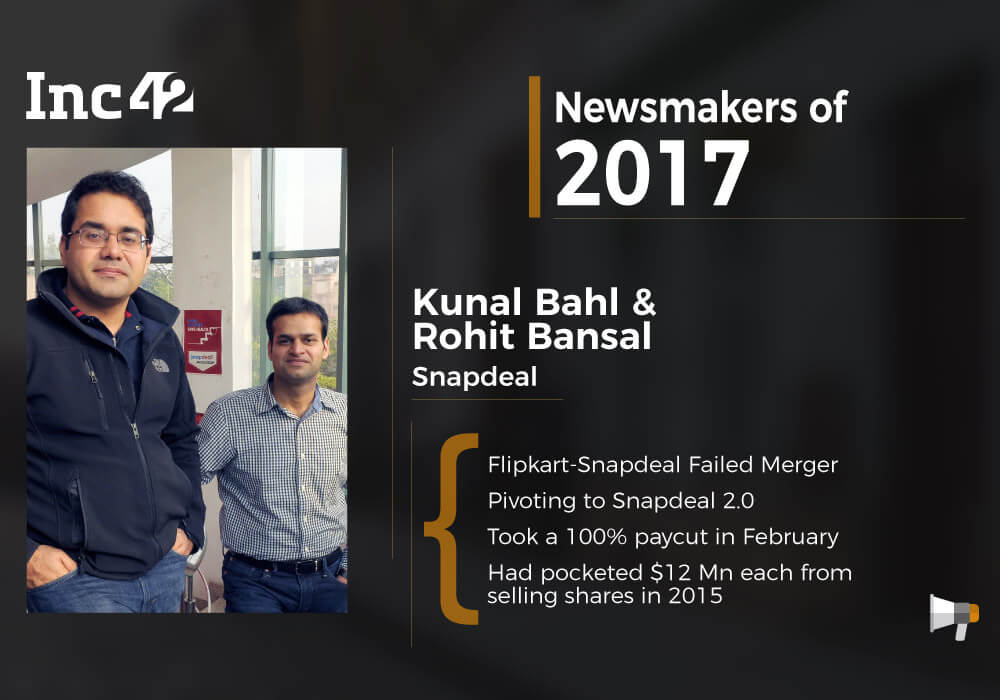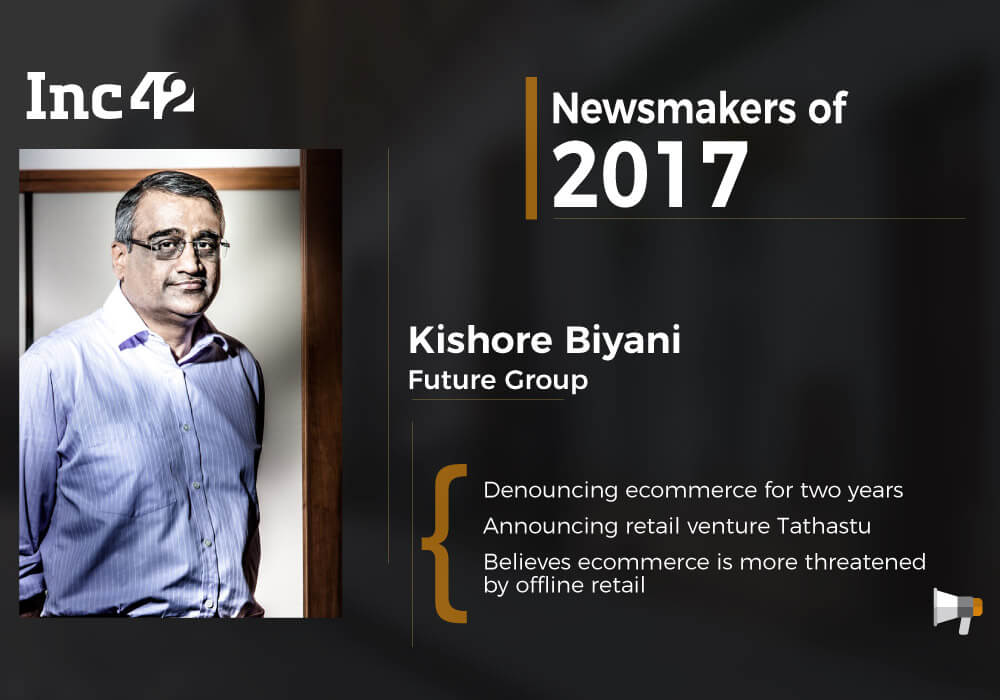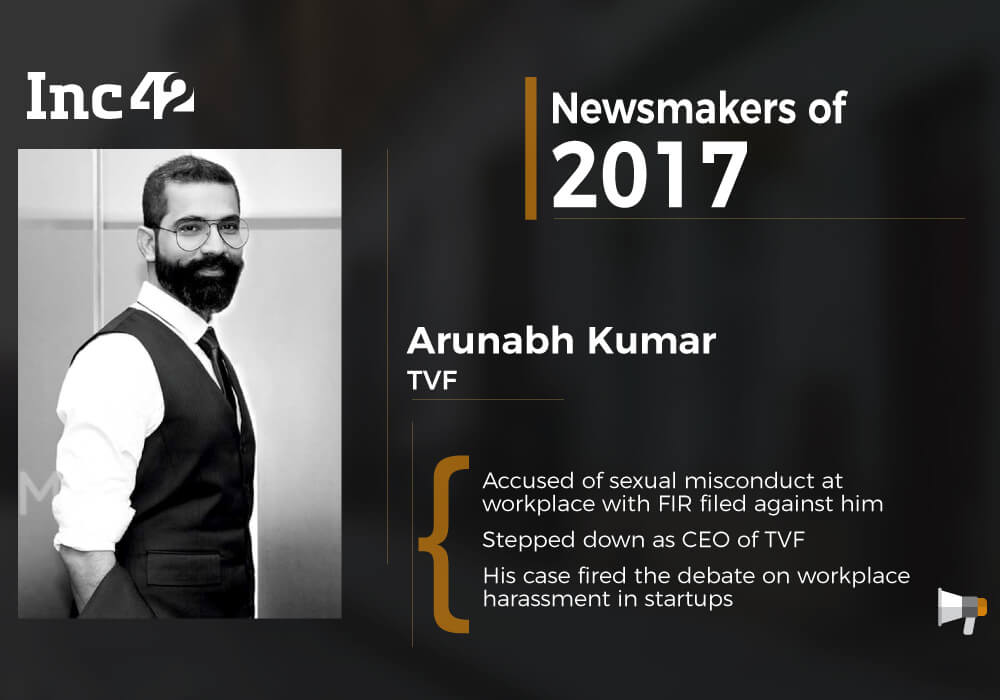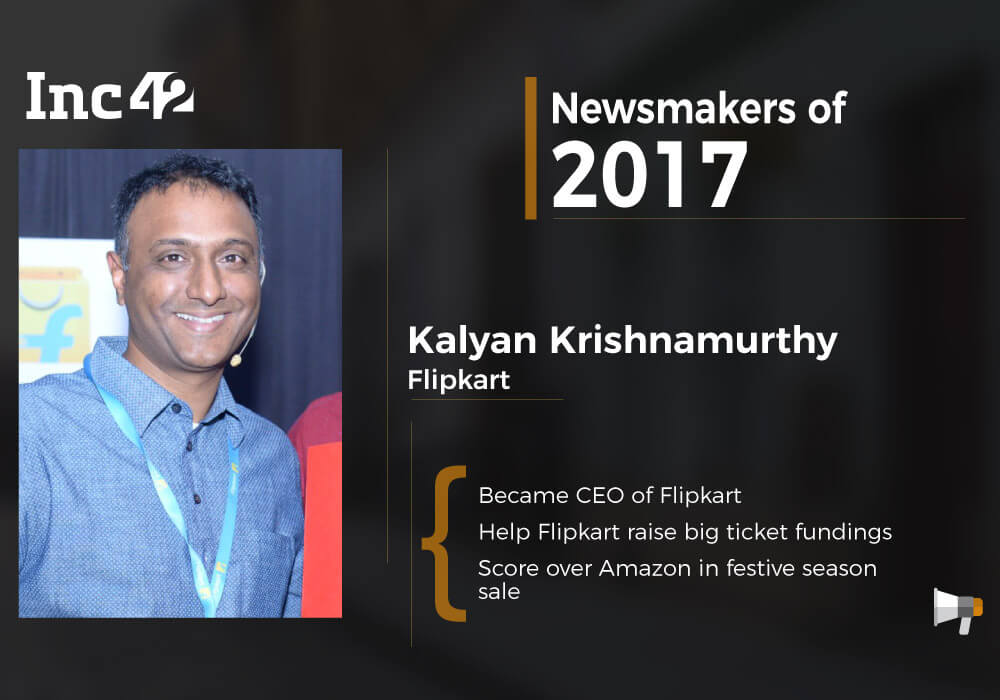SUMMARY
From Masayoshi Son To Kishore Biyani, A Rundown On Key Newsmakers In Indian Startup Ecosystem In 2017
This article is part of Inc42’s Year-End Stories for 2017 where we’ll highlight the major developments, newsmakers from 2017 and their impact on The Indian startup ecosystem. Find all the stories of this series here.
Another year draws to a close. Another chapter finishes. Some would say it was the best of times, some would argue it is the worst of times. Some would say that it was an age of foolishness, some would say it was the age of wisdom. Some rose to the top of headlines, some became side notes.
Money was bet, money was lost. Businesses were built, businesses were shut down. Some became heroes, some were branded villains. All in all, 2017 was different from any other year and yet was so similar to any other year.
As the last few days of this year trickle by, we at Inc42 take time to catch a breath, pause and reflect what did this year bring in for the Indian startup ecosystem? Who are the people who mattered and who are the people who were relegated to history?
Let’s take a quick detour through the memory lane of 2017 to see which brands, people and businesses dominated the news headlines – the newsmakers of 2017.
The Startup Ecosystem Newsmakers Of 2017
Vijay Shekhar Sharma
Dene waala jab bhee deta, deta chhappar phaad ke (When He Gives, He Gives Generously)
Hardly a day passes when Paytm is not in the news. As a journalist, I feel a bit queasy if I do not read about what Paytm has done today Or what is Vijay Shekhar Sharma going to do tomorrow. And ever since PM Modi sounded the death knell for the INR 500 and INR1000 note last November, Vijay Shekhar Sharma, has been one busy guy and thus on our Newsmakers list!
If demonetisation proved the golden egg laying goose for anyone, it was for Paytm and the likes.
No wonder, this year has been the year of fintech for the Indian startup ecosystem. I would say it was the year for Paytm. So what exactly happens when 230 Mn are registered on your platform and are using your digital wallet to pay bills, transfer cash, buy grocery, pay cab bills, buy movie tickets, book plane tickets, avail instant loans, and shop?
Well, that means Vijay Shekhar Sharma gets to debut on the Forbes Billionaire list with a net worth of $1.3 Bn as well as on the 6th “Hurun India Rich List 2017”, a list of the richest people in India with a cut-off at $153 Mn (INR 1,000 Cr). Along with that, he also gets to buy a $12.72 Mn (INR 82 Cr) worth 6,000 ft. residential property in Lutyen’s Delhi.
But more than all these accolades, was the $1.4 Bn funding from SoftBank Group, the Japanese Internet and telecom major, which is a big endorsement for the digital wallet. Paytm is now one of SoftBank’s biggest bets in India and has received just the right kind of fuel to fire its course further.
The launch of Paytm Payments Bank this year, the growing list of its acquisitions as it moves forward from being just a digital player to an ecosystem powering a host of services, and its recent foray into chat with its instant messaging service Paytm Inbox, prove that Paytm not only wants to have it all but VSS makes sure that Paytm gets it all.
But the question is will Paytm be able to replicate the in-app chat service model that We-Chat has successfully done in China? It’s too early to say but then its Vijay Shekhar Sharma we are talking about. And he was the only Indian besides PM Modi who made it to the TIME Magazine’s 100 Most Influential People list in 2017 and was named as UN Environment Program patron for Clean Air. 2018, fingers crossed!
Narendra Modi
This ain’t a song for the broken-hearted
No silent prayer for the faith-departed
I ain’t gonna be just a face in the crowd
You’re gonna hear my voice
When I shout it out loud
And we do hear when he shouts err speaks. Prime Minister Narendra Modi was one person who continued making headlines in 2017 in the startup ecosystem despite being out of the system. And this is not the first time that Modi is one of the newsmakers in the Indian startup ecosystem!
Just before the year ended in 2016, he launched the BHIM app- a Unified Payment Interface-(UPI) based mobile payment application to step up his government’s drive on digital payments.
If demonetisation dominated headlines in 2016, the GST coming into effect in 2017 was also a major policy change from the PM to the Indian economy. Continuing with his focus on startups, he along with the Prime Minister of Israel, Benjamin Netanyahu launched a bilateral innovation challenge for startups in Israel and India – India-Israel Innovation Bridge.
On similar lines, while pitching India as a business-friendly nation, Prime Minister Modi asked the CEOs of Amazon, Google, Microsoft, Apple, among others to invest in India – during his US visit in June 2017.
In the same month, the Government of India announced the launch of the Startup India Virtual Hub which would serve as an online platform where all the stakeholders of the startup ecosystem can collaborate and synergise their efforts.
In a similar vein, he rolled out the Champions Of Change event in August, meeting over 200 startup entrepreneurs in order to create a dialogue between the government and startups in order to get them in sync with the PM’s mission of a ‘New India by 2022’. Which indeed received immense appreciation from the startup and the investor community.
After India leaped over 30 positions in the recently released World Bank’s ease of doing business rankings report, PM Narendra Modi left no efforts to hard sell India as an investment destination. He did the same at the eighth edition of the Global Entrepreneurship Summit 2017 (GES 2017) in Hyderabad, hard selling Make in India and pitching India and its startup ecosystem as an attractive investment destination to global investors.
No wonder Modi was one of the two Indians to make it to the TIME Magazine’s ‘100 Most Influential People ‘ list this year along with Paytm CEO Vijay Shekhar Sharma. Given his natural propensity to make news, we are expecting 2018 is going to be no different. But do expect a lot more interesting announcements coming up from Modi’s desk, which will end up him being in next years newsmakers list too!
Masayoshi Son
Money, money, money
Must be funny
In the rich man’s world
If there’s one person who has had a very busy 2017 in India (and globally), it’s SoftBank CEO Masayoshi Son, the next biggie in our newsmakers list. Masa, as he is popularly called by CEOs who worship him, has been busy with almost every Indian sector worth having a shot at. And if that’s not enough, the Japanese business tycoon was also seen pushing Snapdeal to merge with Flipkart creating a flurry of activity in the Indian startup ecosystem.
Let’s talk about the investments first!
He invested $1.4 Bn in payments player Paytm in the beginning of the year and in the process became a major shareholder. Talking about the funding, Masayoshi made sure it had just the right words to drive home-digital inclusion.
Moving over from payments, Masa got busy with ecommerce in India – trying to bring a merger between its floundering bet Snapdeal and India’s ecommerce major Flipkart. In the process, SoftBank’s interests clashed with those of Snapdeal and its investors and it parted ways with Snapdeal.
So while the merger did not take place as Snapdeal felt its interests sidelined, SoftBank went ahead with funding Flipkart to the tune of $2 Bn, thus placing a major bet in India’s high stake ecommerce battle.
After capturing major stakes in Flipkart and Paytm, Masa went on to explore Indian cab aggregation space and that too just not by pouring in huge sums in funding. This year, SoftBank began its mission of slowly trying to convert its Indian bet Ola into an electric car manufacturer, alongside pumping more money in its recent $1.1 Bn funding round along with Tencent and other investors.
The electric touch can be felt already, as Ola launched Ola Electric, India’s first multi-modal electric platform in Nagpur this year.
And that wasn’t enough for Masa. In parallel to all this, SoftBank is now busy negotiating a deal with Uber to invest $10 Bn. There are also rumours that it might merge the two in India.
What will he do if he decides to invest in Uber and merge Ola with Uber in India?
No one knows the right answers. Maybe at this point not even Masa. But then the fact is that right now with his $100 Bn tech fund he can write out checks which cannot be outbid by any VC.
Besides, there are rumours that Masayoshi Son is going to taste Indian foodtech sector too! As there are reports of SoftBank gearing up for a $200 Mn-$250 Mn investment in foodtech startup Swiggy.
Is there anything that Masa would leave untouched in India? We guess, nothing!
Slowly, besides spreading his wings far and wide in the Indian startup ecosystem with his Vision Fund, Masa has also been quietly building his own anti-Amazon force in India with Flipkart and Paytm its kitty. If enough proof of it was needed, he even went ahead and supported the lobby group Indiatech led by two of its big Indian bets, Flipkart and Ola to help them fight against foreign rivals such as Amazon and Uber. And all this happened in 2017 alone.
But for all the billion-dollar bets he has taken, he just needs to get it right just once more like Alibaba to justify them. Son’s $20 Mn bet in the Chinese ecommerce company paid him off with $65 Bn after Alibaba’s 2014 US initial public offering. And that’s probably why naming his $100 Bn tech fund as Vision Fund is something only Masayoshi Son can justifiably pull off.
In 2017, Masa and his billions have made SoftBank one of the biggest players in the startup ecosystem. Can hardly wait what 2018 will be like.
Kunal Bahl And Rohit Bansal
Rising up, back on the street
Did my time, took my chances
Went the distance, now I’m back on my feet
Just a man and his will to survive
By all means, 2017 was all about survival for Snapdeal and its founders – Kunal Bahl and Rohit Bansal. Surviving employee layoffs, surviving board bickerings, surviving a failed merger with Flipkart, surviving the flight of key people from the sinking ship, and surviving so stay afloat through a last-minute pivot is what kept Kunal and Rohit busy in throughout the year. And thus made it our newsmakers list for 2017.
The ecommerce startup found itself a distant number third or fourth in the ecommerce game and on a very rocky road to profitability. The year started with layoffs at Snapdeal, FreeCharge, and Vulcan Express and with the founder duo announcing a 100% pay cut for themselves in February. Interestingly, however, it came to light in March that the duo had pocketed $12 Mn each by selling shares in 2015. Nevertheless, the cost-cutting drive continued with the firm vacating offices in Mumbai and Gurgaon to cut costs.
When SoftBank which held 33% stake in Snapdeal decided to merge Snapdeal with Flipkart, one of the most talked about merger deals was then set into. And action indeed was in all the months that followed – of board bickering and tussle between minority investors of Snapdeal such as PremjiInvest, Kalaari Capital and Nexus Venture Partners and unruly SoftBank. SoftBank pushed hard for the merger as Snapdeal’s valuation tumbled down to $1 Bn from once $5 Bn.
So much so that it was reported that Flipkart was willing to pay just $300-$400 Mn for acquiring the company.
The Snapdeal founders finally rejected an offer of about $700-800 Mn from Flipkart citing that it was ‘significantly lower’ than $1 Bn bid which it initially made.
In addition, the sale of Freecharge to Axis Bank fetched Snapdeal $60 Mn-enough to survive for the next couple of months. This finally gave Snapdeal the nerve to go ahead with its ‘Plan B’ and pivot itself into a Taobao kind of an open marketplace set-up.
But Plan B meant that layoffs were back in place and key people deserted the company. Further, former and current employees of the floundering ecommerce company anonymously floated a joint letter to co-founders, and also addressed it to the PMO, accusing them of not letting the merger go through for ‘personal motives.’
Meanwhile more trouble came in the way for Snapdeal co-founders Kunal Bahl and Rohit Bansal as it became busy fighting legal battles against Gurugram-based Quickdel Logistics which owns logistics startup GoJavas over charges of criminal breach and cheating. At the same time, the cash-strapped ecommerce company is also trying to sell its in-house logistics arm Vulcan Express.
I am sure both Kunal Bahl and Rohit Bansal knew that transiting to Snapdeal 2.0 was never going to be an easy job for the struggling ecommerce player. But the question is, can Snapdeal 2.0 last through 2018 with all these controversies and hurdles in its way? We will have to wait and watch out for this.
Kishore Biyani
I hate you like I love you..!
This line from a popular Bollywood number best describes the relationship of India’s offline retail king Kishore Biyani with India’s burgeoning online retail.
It seems Kishore Biyani loves to hate ecommerce which makes him part of our newsmakers list. After spewing against ecommerce off and on as well as burning his fingers in ecommerce through FutureBazaar.com, Big Bazaar Direct, and Fab Furnish, Biyani chose to launch a Retail 3.0 business model ‘Tathaastu’ which would blend technology with brick and mortar.
Oh but we are jumping the gun here. Roll back to June 2017, when the Future Group CEO decided that he has had enough and he is not going to invest or operate in ecommerce space for at least the next two years.
At that time, Biyani had famously stated, “It’s stupid to be in the online space. In lifestyle, the ecommerce industry revenue in India will be around $388 Mn (INR 2,500 Cr) and losses too will be of an equivalent amount. Mobile and electronics, too, do not make money online. Having burnt our fingers, we have decided to take a break of at least two years before even thinking anything remotely about online.”
The statement came two months after it decided to close the curtains on online furniture startup FabFurnish, which it acquired in April 2016 for $2.25 Mn to $3 Mn in all-cash deal. It was reported that the acquisition did not work out for the group as planned and they will finally concentrate on one brand – HomeTown.
As per reports, Future Group had witnessed a loss of around $38.8 Mn( INR 250 Cr) on FutureBazaar.com, Big Bazaar Direct, and Fab Furnish that time. A year prior, Future Group also shut down its B2C online retail venture Big Bazaar Direct after finding the business unviable.
In the past, Biyani had criticised Flipkart and other ecommerce firms in India for undercutting the market and selling products at below the cost price, saying that it would hurt other retail channels. But six months have hardly gone by, and Biyani is back with a bang.
Enter Tathatsu – which would blend technology with brick and mortar. Under this model, it plans to become Asia’s largest integrated consumer retailer by 2047 with revenue of in excess of $1 Tn. The leading retail chain is also on a aggressive expansion mode and had recently announced opening 10,000 member – only Easyday stores.
Biyani believes that the much-believed expanding online retail sector in India has a threat from physical retail models like Big Bazaar as the former suffered on account of their low business share and the high cost of business. He recently stated,
Online retail has a threat from us and it’s time people realised that they are not a threat to us, as they don’t even have 1 per cent business share and the cost of doing business is also too high.
However, he also added that though the next trend is digitisation, physical and digital are not different as the layering of technology over physical is what is needed at the moment. While Biyani has been vociferous in his views against ecommerce and online retail from the beginning, he still believes that both are converging and ten years from now everything will converge completely.
Does it mean Biyani will soon be back to his old love err hate ecommerce? We will have to wait for 2018 to reveal that.
Arunabh Kumar
I’m gonna swing from the chandelier, from the chandelier
I’m gonna live like tomorrow doesn’t exist
Like it doesn’t exist
But tomorrow does exist and normally it’s your past that comes to haunt your tomorrow. For TVF founder Arunabh Kumar, it came in the form of the Indian Susan Fowler moment when an anonymous Medium user by the cheeky name of Indian Fowler, accused Arunabh of molestation and harassment.
After she raised her voice through her blogpost titled “The Indian Uber – That Is TVF,” more women came forward and made allegations of sexual misconduct against Kumar.
What followed was a fall into ignominy – from the denial by the TVF management to subsequent FIRs being filed against Arunabh to him finally stepping down as CEO in the aftermath of sexual harassment allegations.
At the time, Kumar posted a letter on his Twitter account explaining the decision. He said,
In the wake of the recent personal attacks, what really breaks me is the blemish on the brand’s true promise. I have therefore taken the decision to step down as the CEO of TVF.
With all this going on, Arunabh remained one of the newsmakers for a couple of months in the Indian startup ecosystem.
With this controversy, TVF found itself in the midst of a damning news spiral. TVF is known for producing quality digital content for viewers from 18-34 years of age with many famous web series such as Qtiyapa, Pitchers, Permanent Roommates, Tripling to their credit.
As per the startup, its original web series have an average viewership of over 2 Mn to 5 Mn per episode. As per latest MCA filings for 2015-2016, revenues stood at INR4.22 Cr for TVF and in a recent conversation with Inc42, Arunabh claimed revenues has grown 5x for this financial year.
While Arunabh’s rise to success and his efforts to make the platform a premium content destination are laudable and well-known, the allegations against him became a cause of grave concern for both him as an entrepreneur and for TVF as a brand. It also pointed to the growing sexist and “ol’ boy” culture at many startup organisations.
But more than the TVF brand which once aspired to be India’s answer to Disney and had also raised $10 Mn (INR 65.6 Cr) from Tiger Global Management and Temasek Boulevard in 2015, it was brand Arunabh that took a bigger hit.
At the time of his stepping down, Kumar mentioned that he will be available to the TVF team as a mentor. But will this IIT Kharagpur engineer who engineered TVF to be the premium content destination for consumers and advertisers alike be ever back to the helm?
At the moment, it is highly unlikely to believe that kind of tomorrow exists for Arunabh. But we will wait for 2018 to see if any redemption awaits him in the future.
Kalyan Krishnamurthy
Far over the misty mountains cold
To dungeons deep and caverns old
We must away ere break of day
To seek the pale enchanted gold.
And boy oh boy, did Kalyan Krishnamurthy bring the gold rush back to Flipkart or what. In a rather surprising move, Kalyan Krishnamurthy replaced Binny Bansal as the new CEO of India’s homegrown ecommerce behemoth in January this year. And thus landed on our Newsmakers list for 2017.
Kalyan was heading the Category Design Organisation and was a key lieutenant of Lee Fixel, global head of private investments at Flipkart’s largest investor Tiger Global Management.
Kalyan’s agenda was daunting – make Flipkart turnaround, help the floundering ecommerce major raise a fresh round of funds given that it was struggling to attract new investors at its preferred valuation of $15 Bn.
And finally they did strike gold. The ecommerce unicorn managed to raise $1.4 Bn funding from Tencent, eBay and Microsoft in April of this year at a valuation of $11.6 Bn.
Sachin Bansal and Binny Bansal, founders of Flipkart said, “This is a landmark deal for Flipkart and for India as it endorses our tech prowess, our innovative mindset and the potential we have to disrupt traditional markets.”
And it was. Because it was the largest funding round in the 10-year history of the ecommerce marketplace and marked the biggest investment till date in the Indian Internet sector till that time.
As the gold rush did not stop here for Flipkart under the leadership of Kalyan Krishnamurthy. As, SoftBank and Masayoshi Son came in with their billions in August, taking the round up to $4 Bn through a mix of primary and secondary capital from the SoftBank Vision Fund.
But the real triumph came in the festive season sales where Flipkart surged ahead of rival Amazon. As per a recent RedSeer Consulting report, the etailing industry managed generated $1.5 Bn sales ( INR 9,000 Cr) in 2017. As compared to $1.05 Bn generated in 2016 edition, this year saw a y-o-y growth of ~40%.
Further, data showed that Flipkart had a clear lead in the total sales in the 2017 period (even higher than 2016), with its very high consumer brand recall (as per RedSeer research) playing a key role in driving the sales.
As the year draws to a close, the ecommerce firm has reported a growth of 43% in gross merchandise value (GMV) for the six months ended 30 September 2017.
It’s a long way before a real turnaround happens and Flipkart inches closer to profitability or even an IPO.
But at least for now some part of Flipkart’s sheen is back and Kalyan has all the right to bask in its glory!
But that’s not all Kalyan was dealing with the entire year. He was also seen experimenting with new ways to lure and retain employees in the ecommerce major. In what seemed to be a bumper Diwali for Flipkart employees, the board of India’s most famous ecommerce startup approved a plan to repurchase employee stock options in a $100 Mn ESOP repurchase plan.
With Flipkart employees getting liquidity opportunity through the ESOP repurchase plan, more startups will be encouraged to tread this route hopefully in the coming times. The move could benefit close to 6,000 current and former employees at Flipkart. No wonder, as the driving force behind India’s ecommerce behemoth, Kalyan Krishnamurthy is expected to set more such trends in 2018.
So these were the newsmakers in 2017, the high stake players of the year, and like every other year, 2018 will have its own share of names which will hit the headlines and will be branded as newsmakers. But that’s a story for next year. For now, stay tuned for the next story – Startup Shutdowns of 2017.



